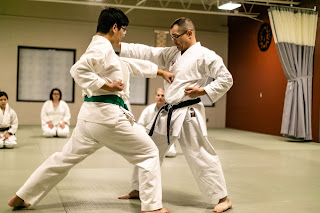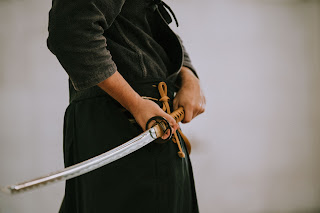What is ai-uchi?
How was it used by the samurai?
Ai-uchi, to most practitioners, simply means the two sides of a bamboo stave strike each other at the same time, so their points cancel out each other in a contest. It also means “mutual strikes.” Your strike hits the opponent the same time as he strikes you. So theoretically, both of you die.
There are a number of things to consider concerning ai-uchi. In a sportive contest of point-taking, like kendo or karate, it's a lot of fun to just go at it and strike the opponent without fear of much bodily injury, thanks to rules and protective gear. But the samurai were a conservative lot. Their philosophy of fighting and combat—which may surprise modern day martial arts people who strut and preen about their willingness to fight with anybody—was very, very reserved.
Their conclusions were that there were three things that can result from a real battle, and two out of three were very, very bad. The good result is if you win and the other side dies. The really bad result is if the other guy wins and you die, and finally the third is still bad news for you; ai-uchi is when both of you kill each other off.
Now, two out of three chances of killing your enemy might not be bad if you're fighting to defend someone else, and you're willing to sacrifice yourself to save your lord and/or loved ones from the enemy attacker, as long as you destroy the other guy. But in terms of self-preservation, these are really lousy odds.
So really philosophical warriors, who thought about the consequences a lot, were quite reluctant to engage in real combat at the jump of the hat. Even if they were technically very good, there's no telling what chance and luck may bring to you . . . you could slip on a banana peel, for example, and so the lousiest warrior for the other side could take your head. If he did have to go into battle, the classical warrior was pretty much resigned to accepting the fact that the odds were two to one that he'd be dead come the next day, all other things being equal.
Learn about the different ways of interpreting ai-uchi.
An International Martial Arts Association for Everyone
Do you like reading martial arts articles like these?
When you join an international martial arts association like SMAA, you’ll receive our quarterly journal full of martial arts articles and excerpts from high ranking SMAA members’ books. You don’t have to be a martial artist either. Anyone, from anywhere around the world, can become an SMAA member!
Associate members ($25 a year) receive the quarterly journal, email newsletters, an associate member certificate, and discounts at SMAA events.
Full members ($30 a year) receive everything in the associate tier, along with the ability to receive rank certification and teaching titles.
Contact us today to join!












